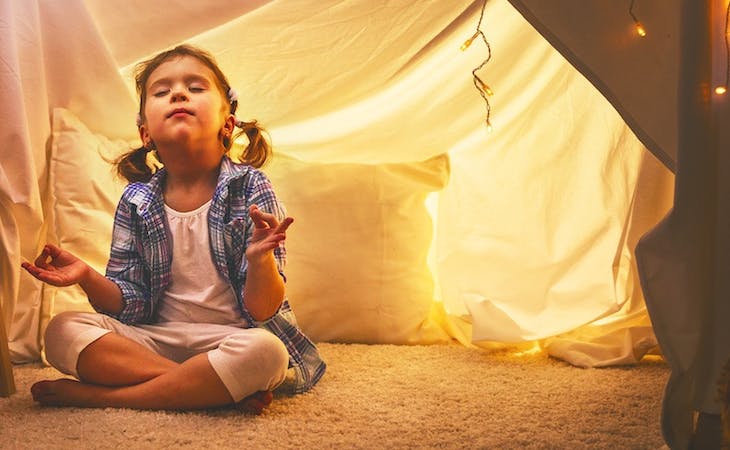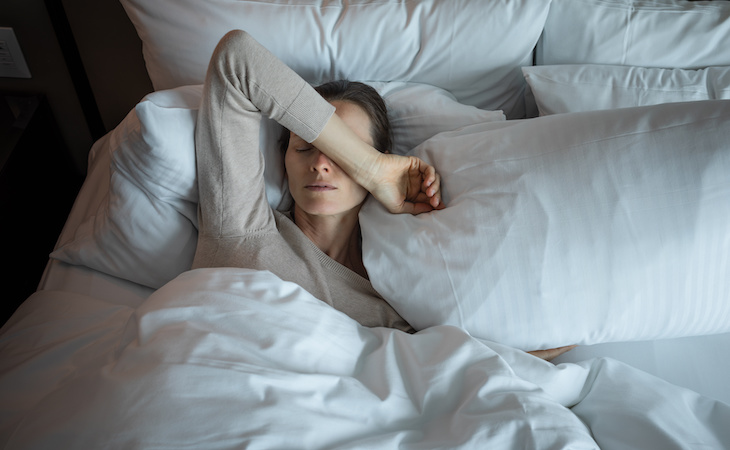Schools around the country have closed indefinitely in an effort to stop the spread of COVID-19, the novel coronavirus, which means kids will be home for the foreseeable future. And this abrupt change in routine—as well as everything that’s going on in the news—may lead to anxiety for your child.
According to the Centers for Disease Control and Prevention (CDC), children and teens often respond more strongly to crises, and that can lead to changes in their sleeping and eating patterns as well as difficulty sleeping and concentrating.
Children need sleep in order to grow and develop, so it’s important to find coping mechanisms if you notice your offspring struggling with anxiety during this uncertain time.
Here, we’ve rounded up a host of expert-backed strategies to help you manage your child’s anxiety and improve their sleep quality while they—and you—adjust to their new normal.
Discuss what’s happening in the news
For children who are old enough to understand what the coronavirus is—i.e. children who have taken a science class in school—consider having a conversation about the statistics to ease their fears. “The numbers are mostly still in a child’s and parent’s favor,” says Lynelle Schneeberg, PsyD, pediatric sleep psychologist and author of Become Your Child’s Sleep Coach: The Bedtime Doctor’s 5-Step Guide, Ages 3-10. “Younger kids get very mild cases.”
Another thing you can talk about to calm anxiety: easy actions your child can take to stay safe. Schneeberg points to the list of five preventative tips Google pinned to its home page:
- Hands: Wash them often
- Elbow: Cough into it
- Face: Don’t touch it
- Feet: Stay more than three feet apart
- Feel sick? Stay home
Get your kids moving
Experts recommend children and teens get at least one hour of moderate to vigorous activity each day—and research shows children who are physically active during the day have an easier time falling asleep at night.
While sports practices, dance classes, and the like are all on hold right now, that doesn’t mean you can’t work movement into your child’s day. As Harvard Health notes, your family can still spend time outside, so long as you practice social distancing (maintaining enough distance between yourself and another person to avoid getting infected or infecting someone else).
Taking your kids for a walk or playing a backyard game of soccer are two outdoor activities you can do—you’ll want to avoid playgrounds, though, since they’re not cleaned regularly.
Meanwhile, yoga is a good indoor activity for children, says Schneeberg. A study published in Frontiers in Psychology shows yoga has stress-relieving and mood-boosting benefits for kids. Check to see if your local studio is offering free online classes—or head to YouTube, where you can find tons of free yoga classes for kids.
Other indoor activities, like puzzles and games, will also tire kids out so that it’s easier for them to drift off at night, Schneeberg adds.
Stick to a routine as much as possible
“Kids love a routine,” says Annie Miller, licensed clinical social worker in Washington, DC, who specializes in treating anxiety and sleep problems. So if you have wake-up and bedtime routines you’ve already been following, try to stick to them as much as possible. “This can make children feel more in control and allow them to feel like things aren’t changing as much,” Miller explains.
It’s not just younger children who benefit from routine—so do teens. While it might be especially tempting for teens to stay up late, texting friends or watching TikTok videos into the wee hours, sleep deprivation in teens can lead to anxiety. Schneeberg suggests teens follow the “school +2” rule— “keep your bedtime and rise time two hours later on the weekend then it is on school days.”
Connect with friends and family virtually
A study published in the Journal of The American Academy of Child and Adolescent Psychiatry links social isolation in primary- and secondary-school children to mental health problems such as anxiety and depression.
So what is there to do now that playdates are off the table? Your kids can still enjoy face time—literally—with their friends (and loved ones) via FaceTime, Skype, or any other video messaging service you have access to, says Miller. There are also a lot of places offering virtual activities for kids. Many local libraries, for example, are hosting virtual storytimes.
Provide a calming presence before bedtime
If your child is struggling to fall asleep on their own these days, take a softer approach than you normally would to bedtime, says Schneeberg. Instead of saying goodnight and getting out—an approach that can help children learn to fall asleep independently in normal circumstances—sit outside the room with a book until they doze off.
“I would still try to keep the parent out of the bed,” says Schneeberg, “and out of any actual back-rubbing or hair-stroking—things that are really hard to give up again later.” Instead, act as what Schneeberg calls a sentry: ” You’re in the door, you’re doing your thing, you’re looking calm, you’re not talking, but you’re there.”




